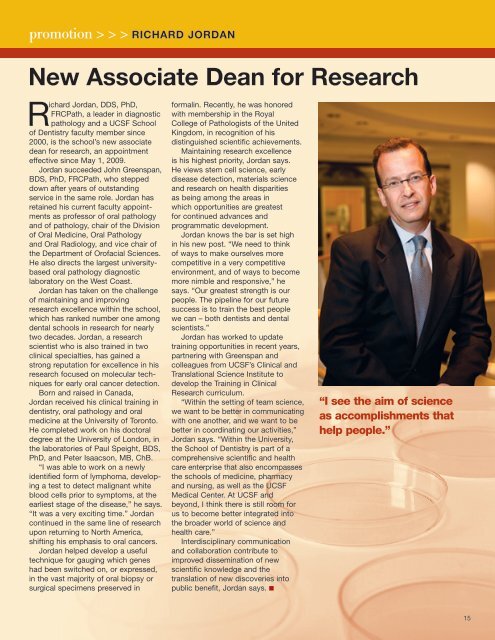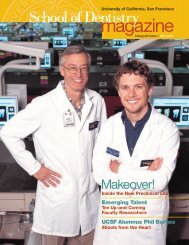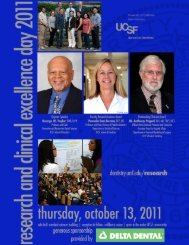2010 - UCSF School of Dentistry - University of California, San ...
2010 - UCSF School of Dentistry - University of California, San ...
2010 - UCSF School of Dentistry - University of California, San ...
You also want an ePaper? Increase the reach of your titles
YUMPU automatically turns print PDFs into web optimized ePapers that Google loves.
promotion > > > RICHARD joRDAn<br />
new Associate Dean for Research<br />
Richard Jordan, DDS, PhD,<br />
FRCPath, a leader in diagnostic<br />
pathology and a <strong>UCSF</strong> <strong>School</strong><br />
<strong>of</strong> <strong>Dentistry</strong> faculty member since<br />
2000, is the school’s new associate<br />
dean for research, an appointment<br />
effective since May 1, 2009.<br />
Jordan succeeded John Greenspan,<br />
BDS, PhD, FRCPath, who stepped<br />
down after years <strong>of</strong> outstanding<br />
service in the same role. Jordan has<br />
retained his current faculty appointments<br />
as pr<strong>of</strong>essor <strong>of</strong> oral pathology<br />
and <strong>of</strong> pathology, chair <strong>of</strong> the Division<br />
<strong>of</strong> Oral Medicine, Oral Pathology<br />
and Oral Radiology, and vice chair <strong>of</strong><br />
the Department <strong>of</strong> Or<strong>of</strong>acial Sciences.<br />
He also directs the largest universitybased<br />
oral pathology diagnostic<br />
laboratory on the West Coast.<br />
Jordan has taken on the challenge<br />
<strong>of</strong> maintaining and improving<br />
research excellence within the school,<br />
which has ranked number one among<br />
dental schools in research for nearly<br />
two decades. Jordan, a research<br />
scientist who is also trained in two<br />
clinical specialties, has gained a<br />
strong reputation for excellence in his<br />
research focused on molecular techniques<br />
for early oral cancer detection.<br />
Born and raised in Canada,<br />
Jordan received his clinical training in<br />
dentistry, oral pathology and oral<br />
medicine at the <strong>University</strong> <strong>of</strong> Toronto.<br />
He completed work on his doctoral<br />
degree at the <strong>University</strong> <strong>of</strong> London, in<br />
the laboratories <strong>of</strong> Paul Speight, BDS,<br />
PhD, and Peter Isaacson, MB, ChB.<br />
“I was able to work on a newly<br />
identified form <strong>of</strong> lymphoma, developing<br />
a test to detect malignant white<br />
blood cells prior to symptoms, at the<br />
earliest stage <strong>of</strong> the disease,” he says.<br />
“It was a very exciting time.” Jordan<br />
continued in the same line <strong>of</strong> research<br />
upon returning to North America,<br />
shifting his emphasis to oral cancers.<br />
Jordan helped develop a useful<br />
technique for gauging which genes<br />
had been switched on, or expressed,<br />
in the vast majority <strong>of</strong> oral biopsy or<br />
surgical specimens preserved in<br />
formalin. Recently, he was honored<br />
with membership in the Royal<br />
College <strong>of</strong> Pathologists <strong>of</strong> the United<br />
Kingdom, in recognition <strong>of</strong> his<br />
distinguished scientific achievements.<br />
Maintaining research excellence<br />
is his highest priority, Jordan says.<br />
He views stem cell science, early<br />
disease detection, materials science<br />
and research on health disparities<br />
as being among the areas in<br />
which opportunities are greatest<br />
for continued advances and<br />
programmatic development.<br />
Jordan knows the bar is set high<br />
in his new post. “We need to think<br />
<strong>of</strong> ways to make ourselves more<br />
competitive in a very competitive<br />
environment, and <strong>of</strong> ways to become<br />
more nimble and responsive,” he<br />
says. “Our greatest strength is our<br />
people. The pipeline for our future<br />
success is to train the best people<br />
we can – both dentists and dental<br />
scientists.”<br />
Jordan has worked to update<br />
training opportunities in recent years,<br />
partnering with Greenspan and<br />
colleagues from <strong>UCSF</strong>’s Clinical and<br />
Translational Science Institute to<br />
develop the Training in Clinical<br />
Research curriculum.<br />
“Within the setting <strong>of</strong> team science,<br />
we want to be better in communicating<br />
with one another, and we want to be<br />
better in coordinating our activities,”<br />
Jordan says. “Within the <strong>University</strong>,<br />
the <strong>School</strong> <strong>of</strong> <strong>Dentistry</strong> is part <strong>of</strong> a<br />
comprehensive scientific and health<br />
care enterprise that also encompasses<br />
the schools <strong>of</strong> medicine, pharmacy<br />
and nursing, as well as the <strong>UCSF</strong><br />
Medical Center. At <strong>UCSF</strong> and<br />
beyond, I think there is still room for<br />
us to become better integrated into<br />
the broader world <strong>of</strong> science and<br />
health care.”<br />
Interdisciplinary communication<br />
and collaboration contribute to<br />
improved dissemination <strong>of</strong> new<br />
scientific knowledge and the<br />
translation <strong>of</strong> new discoveries into<br />
public benefit, Jordan says. n<br />
“I see the aim <strong>of</strong> science<br />
as accomplishments that<br />
help people.”<br />
15




